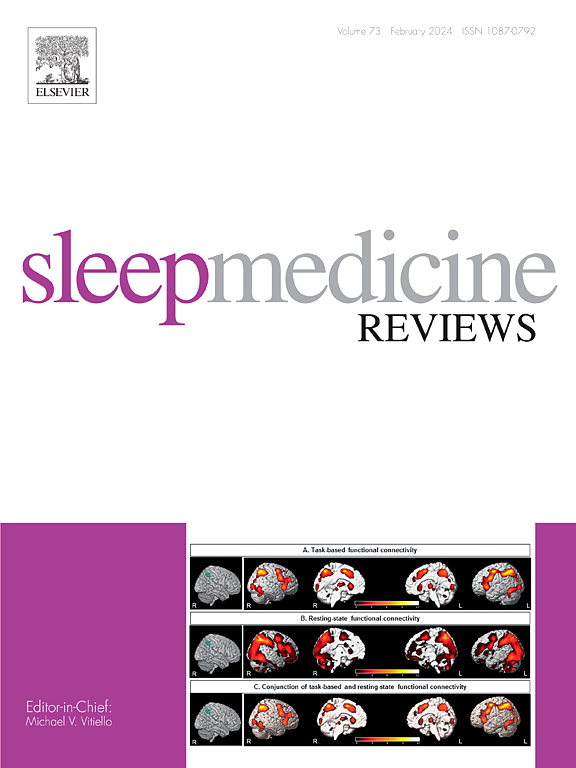轻度创伤性脑损伤后睡眠的系统回顾和荟萃分析:根据年龄和损伤后时间的文献综合
IF 9.7
1区 医学
Q1 CLINICAL NEUROLOGY
引用次数: 0
摘要
本系统综述和荟萃分析(PROSPERO: CRD42021287081)比较了既往mTBI患者和对照组的睡眠情况。PubMed、Scopus和EMBASE的检索截止到2024年11月2日。计算客观(睡眠时间、睡眠效率、睡眠阶段[N1-3, REM]比例)和主观(匹兹堡睡眠质量指数[PSQI])睡眠测量的平均差异,并根据年龄(成人≥18岁;儿童<;18y)和损伤后/恢复阶段(<1w, <1m, 1-12m,≥1y)。并根据年龄和恢复阶段进行定性综合。69项研究符合标准。在儿童和成人中,客观睡眠时间和睡眠效率的平均差异在任何恢复阶段都没有统计学意义。与对照组相比,在随访1 - 12个月时,mTBI成人N1睡眠(Mean diff. [95%CI], 1.28% [0.63%, 1.93%], p = 0.014)和N3睡眠(- 1.16% [- 2.08%,- 0.23%],p = 0.033)比例增加,REM睡眠(- 3.37% [- 6.28%,- 0.46%],p = 0.023)比例减少;然而,当被选择偏差混淆的研究被移除时,这些统计差异就不存在了。主观上,相对于对照组,成年mTBI患者在1周(2.53[1.43,3.62]分,p = 0.005)和1个月(2.26 [1.47,3.04],p <;0.001), 1-12个月(2.86 [1.26,4.45],p <;0.001)和≥1年(2.62 [1.96,3.28],p <;0.001)随访。文献表明,先前患有mTBI的个体的主观睡眠比对照组差,但支持性的客观数据有限。在解释这些发现时需要考虑的一个限制是,少数(45%)的研究具有低偏倚风险。需要更多的研究来检查mTBI后的客观睡眠,特别是对于患有mTBI的儿童。本文章由计算机程序翻译,如有差异,请以英文原文为准。
A systematic review and meta-analysis of sleep following mild traumatic brain injury: A synthesis of the literature according to age and time-since-injury
This systematic review and meta-analysis (PROSPERO: CRD42021287081) compared sleep in individuals with prior mTBI against that of controls. PubMed, Scopus, and EMBASE were searched through to November 2, 2024. Mean differences were calculated for objective (sleep duration, sleep efficiency, sleep stage [N1-3, REM] proportions) and subjective (Pittsburgh Sleep Quality Index [PSQI]) sleep measures, with analyses conducted based on age (adult ≥18y; child <18y) and time-since-injury/recovery phase (<1w, <1m, 1–12m, ≥1y). Qualitative syntheses were also conducted according to age and recovery phase. Sixty-nine studies met criteria. In children and adults, mean differences in objective sleep duration and sleep efficiency were not statistically significant for any recovery phase. Relative to controls, adults with mTBI had proportionately more N1 (Mean diff. [95%CI], 1.28 % [0.63 %,1.93 %], p = 0.014) and less N3 (−1.16 % [-2.08 %,-0.23 %], p = 0.033) sleep at 1–12-month follow-up, and less REM (−3.37 % [-6.28 %,-0.46 %], p = 0.023) at ≥1 year follow-up; however, these statistical differences did not remain when studies confounded by selection bias were removed. Subjectively, relative to controls, adults with mTBI had higher PSQI scores at <1-week (2.53 [1.43,3.62] points, p = 0.005), <1-month (2.26 [1.47, 3.04], p < 0.001), 1-12-month (2.86 [1.26,4.45], p < 0.001) and ≥1-year (2.62 [1.96, 3.28], p < 0.001) follow-up. The literature suggests individuals with prior mTBI have poorer subjective sleep than controls, but supportive objective data are limited. A limitation to consider when interpreting these findings is that a minority (45 %) of studies had low risk of bias. More research examining objective sleep post-mTBI is needed, especially for children with mTBI.
求助全文
通过发布文献求助,成功后即可免费获取论文全文。
去求助
来源期刊

Sleep Medicine Reviews
医学-临床神经学
CiteScore
20.10
自引率
3.80%
发文量
107
期刊介绍:
Sleep Medicine Reviews offers global coverage of sleep disorders, exploring their origins, diagnosis, treatment, and implications for related conditions at both individual and public health levels.
Articles comprehensively review clinical information from peer-reviewed journals across various disciplines in sleep medicine, encompassing pulmonology, psychiatry, psychology, physiology, otolaryngology, pediatrics, geriatrics, cardiology, dentistry, nursing, neurology, and general medicine.
The journal features narrative reviews, systematic reviews, and editorials addressing areas of controversy, debate, and future research within the field.
 求助内容:
求助内容: 应助结果提醒方式:
应助结果提醒方式:


